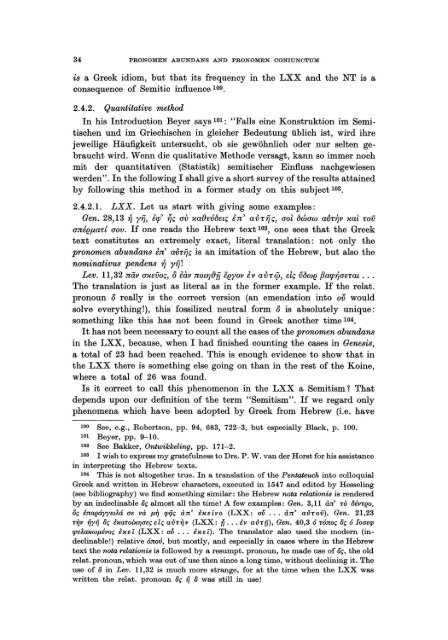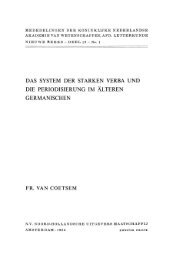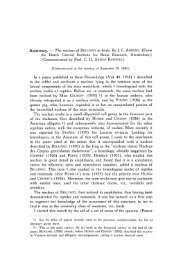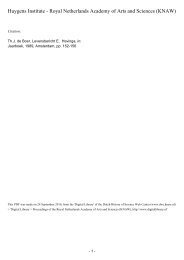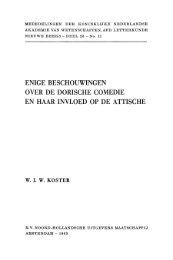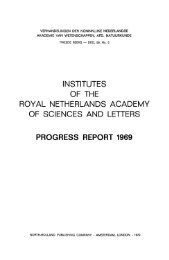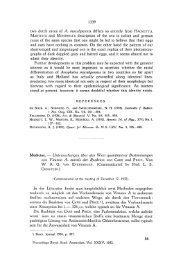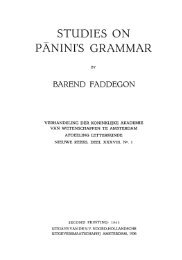Pronomen Abundans and Pronomen Coniunctum. A ... - DWC
Pronomen Abundans and Pronomen Coniunctum. A ... - DWC
Pronomen Abundans and Pronomen Coniunctum. A ... - DWC
Create successful ePaper yourself
Turn your PDF publications into a flip-book with our unique Google optimized e-Paper software.
34 PRONOMEN ABUNDANS AND PRONOMEN CONIUNCTUM<br />
is a Greek idiom, but that its frequency in the LXX <strong>and</strong> the NT is a<br />
consequence of Semitic influence 100.<br />
2.4.2. Quantitative method<br />
In his Introduction Beyer says 101: "Falls eine Konstruktion im Semitischen<br />
und im Griechischen in gleicher Bedeutung üblich ist, wird ihre<br />
jeweilige Häufigkeit untersucht, ob sie gewöhnlich oder nur selten gebraucht<br />
wird. Wenn die qualitative Methode versagt, kann so immer noch<br />
mit der quantitativen (Statistik) semitischer Einfluss nachgewiesen<br />
werden". In the following I shall give a short survey of the results attained<br />
by following this method in a former study on this subject 102.<br />
2.4.2.1. LXX. Let us start with giving some examples:<br />
Gen. 28,13 ij yij, ècp' ~ç av "a-&evCu:tç in' alrl'ijç, aol {Jwaw alrcijv "al 7:0V<br />
ani(!/"w7:{ aov. If one reads the Hebrew text 103, one sees that the Greek<br />
text constitutes an extremely exact, literal translation : not only the<br />
pronomen abundans in' aV7:ijç is an imitation of the Hebrew, but also the<br />
nominativus pendens ij yij!<br />
Lev. 11,32 niiv a"evoç, ö iàv notrr{}fj leyov iv aiJnp, elç i5{Jwe {Jarp~ae7:at ...<br />
The translation is just as literal as in the former example. If the relat.<br />
pronoun ö really is the correct version (an emendation into o'Ó would<br />
solve everything!), this fossilized neutral form ö is absolutely unique :<br />
something like this has not been found in Greek another time 104.<br />
It has not been necessary to count all the cases of the pronomen abundans<br />
in the LXX, because, when I had finished counting the cases in Genesis,<br />
a total of 23 had been reached. This is enough evidence to show that in<br />
the LXX there is something else going on than in the rest of the Koine,<br />
where a total of 26 was found.<br />
Is it correct to call this phenomenon in the LXX a Semitism? That<br />
depends upon our definition of the term "Semitism" . If we regard only<br />
phenomena which have been adopted by Greek from Hebrew (i.e. have<br />
100 See, e.g., Robertson, pp. 94, 683, 722-3, but especially Black, p. 100.<br />
101 Beyer, pp. 9-10.<br />
102 See Bakker, Ontwikkeling, pp. 171-2.<br />
103 I wish to express my gratefulness to Drs. P. W . van der Horst for his assistance<br />
in interpreting the Hebrew texts.<br />
104 This is not altogether true. In a translation of the Pentateuch into colloquial<br />
Greek <strong>and</strong> written in Hebrew characters, executed in 1547 <strong>and</strong> edited by Hesseling<br />
(see bibliography) we find something similar: the Hebrew nota relationis is rendered<br />
by an indeclinabIe oç almost all the time! A few examples: Gen. 3,11 tin' TO t5ÉvTeo,<br />
oç ÉnaeáyyetÀá ae và "'-YJ rpéj.ç àn' beeivo (LXX: ov .. . àn' athoii), Gen. 21,23<br />
T-YJV 1jyij oç É'K.aTobeYjaeç elç aVT-YJv (LXX: fJ . •• Év aVTfl), Gen. 40,3 Ó T6noç oç ó Ioaerp<br />
rpvÀa'K.w",Évoç É'K.ei (LXX: ov ... È'K.ei). The translator also used the modern (indeclinabIe!)<br />
relative ónov, but mostly, <strong>and</strong> especially in cases where in the Hebrew<br />
text the nota relationis is followed by a resumpt. pronoun, he made use of lJç, the old<br />
relat. pronoun, which was out of use then since a long time, without dec1ining it. The<br />
use of 0 in Lev. 11,32 is much more strange, for at the time when the LXX was<br />
written the relat. pronoun oç 1) 0 was still in use!


